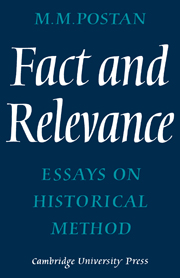Book contents
- Frontmatter
- Contents
- Acknowledgments
- Preface
- 1 Reason in social study
- 2 History and the social sciences
- 3 The historical method in social science
- 4 Function and dialectic in economic history
- 5 Fact and relevance in historical study
- 6 Economic and social history
- 7 Economic growth
- 8 A plague of economists?
- 9 The uses and abuses of economics
- 10 Agriculture and economic development: a lesson of history
- 11 Technological progress in post-war Europe
- 12 A study of history
- 13 Karl Marx: a democrat?
- 14 Hugh Gaitskell: political and intellectual progress
- Index
3 - The historical method in social science
Published online by Cambridge University Press: 07 October 2011
- Frontmatter
- Contents
- Acknowledgments
- Preface
- 1 Reason in social study
- 2 History and the social sciences
- 3 The historical method in social science
- 4 Function and dialectic in economic history
- 5 Fact and relevance in historical study
- 6 Economic and social history
- 7 Economic growth
- 8 A plague of economists?
- 9 The uses and abuses of economics
- 10 Agriculture and economic development: a lesson of history
- 11 Technological progress in post-war Europe
- 12 A study of history
- 13 Karl Marx: a democrat?
- 14 Hugh Gaitskell: political and intellectual progress
- Index
Summary
Few other branches of university study are more indigenous to Cambridge than the one which I have the great honour to represent. It was in Cambridge that Archdeacon Cunningham laid the foundations of economic history as a university subject, and it was out of this University that the long stream of his pioneer books issued. Cunningham was a great missionary, for economic history was to him part of his political and philosophical faith. He believed that English thought, and English politics of his time, wanted rescuing from the a-moral and a-national prejudices of liberal economics and whig history; and it was from economic history as then taught in Germany that the cure would come. This belief led him to concentrate very largely on the problems of economic policy to the exclusion of many of the topics which form the scope of economic history now. Yet it is remarkable how, in spite of his preoccupations, the work has survived the faith which prompted it and in its main outlines endures to our own day. If economic historians of the next generation were able to devote themselves to specialized study, it was because the field was occupied for them and the foundation laid by Cunningham.
But what the generation which followed owed to the man who laid the foundation, the present generation owes to the man who built on them: the first holder of the Chair, the master mason who has preceded me.
- Type
- Chapter
- Information
- Fact and RelevanceEssays on Historical Method, pp. 22 - 34Publisher: Cambridge University PressPrint publication year: 1971
- 1
- Cited by



